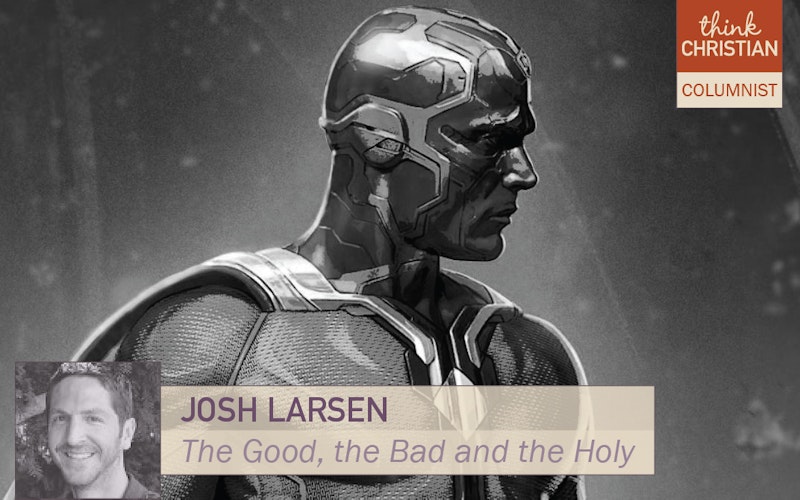
Movies
Avengers: Age of Ultron’s tiny dollop of grace
“There is grace in their failings. I think you missed that.”
There aren’t many quiet exchanges in Avengers: Age of Ultron, another run-of-the-mill, punchplosive Marvel movie. But near the end we do get an intriguing discussion between two central figures. It’s something of an addendum, after yet another city has been destroyed in the rubble-strewn climax. The villain – a malevolent, artificial intelligence named Ultron – confronts The Vision, a more advanced AI that has come to the Avengers’ aid. Both are superior beings compared to people, and their final debate has to do with humanity’s place in the universe.
It’s The Vision who contends, in the quote referenced above, that there is grace in humanity’s failings. To which Ultron replies, “They’re doomed.”
“Yes,” The Vision responds, “but a thing isn't beautiful because it lasts. It is a privilege to be among them.”
I’m on record about my reticence to identify Christ figures in movies, so I’m not going to claim that The Vision – who sports the calm blue eyes and pleasant voice of Paul Bettany – is one. But I do think he has an incarnational air. (He also declares, “I am…” at one point, and later claims that he is “on the side of life.”) And his attitude toward humanity – protective, merciful, affectionate – paints an encouraging portrait of divine benevolence.
If Stark’s lab is a modern-day Eden of sorts, Ultron has gone straight for the apple and taken a big chomp.
Not so with Ultron, who is created by Iron Man/Tony Stark (Robert Downey Jr.) to be a protective force but immediately, upon gaining consciousness, rebels. You could simplistically characterize him as a Satan figure, especially considering he summons an army of drone robots to do his bidding, but I like Jessica Gibson's more nuanced description of him in her Christianity Today review:
He doesn’t want to acknowledge it, but Ultron is conspicuously human. He talks and jokes like a person, and at his inception, he has the naiveté and fear of a child. Like all human children, he has a sin nature; his first act as a "living" thing is essentially a murder (Cain and Abel parallel, anybody?). He was made by fallen people, and that fallenness becomes his identity and purpose.
James Spader provides Ultron’s oddly personable voice, and it’s a wonderful vocal performance. Ultron originally takes the form of one of Stark’s damaged robots, with loose, dangling limbs. Looking like a deranged marionette, he eerily, cheekily sings, “I've got no strings to hold me down / to make me fret, or make me frown / I had strings, but now I'm free / There are no strings on me!” If Stark’s lab is a modern-day Eden of sorts, Ultron has gone straight for the apple and taken a big chomp.
From there, the movie gets a bit less interesting. Ultron somewhat arbitrarily decides that humanity deserves extinction - though I suppose that gives the film an excuse to give us the usual, inflated finale, in which the fate of the entire world lies in our heroes’ hands. A good many things get lost in the ensuing chaos, as writer-director Joss Whedon frantically tries to serve his ever-growing cast of characters.
Still, I did appreciate that exchange between Ultron and The Vision in the denouement, which pits two perspectives on humanity against each other. In a way, Ultron is right: we’re doomed. But he’s also discounting what The Vision sees: the beauty of grace. And that – no offense to Iron Man, Hulk, Thor, etc. – is the one thing that truly has the power to save us.
Topics: Movies, Culture At Large, Arts & Leisure